Related Research Articles
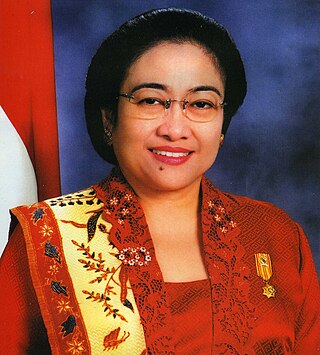
Diah Permata Megawati Setiawati Sukarnoputri is an Indonesian politician who served as the fifth president of Indonesia from 2001 to 2004 and the eighth vice president under President Abdurrahman Wahid from 1999 to 2001.

The Indonesian Democratic Party of Struggle is a centre to centre-left secular-nationalist political party in Indonesia. Since 2014, it has been the ruling and largest party in the House of Representatives (DPR), having won 110 seats in the latest election. The party is led by Megawati Sukarnoputri, who served as the president of Indonesia from 2001 to 2004.

Presidential elections were held in Indonesia on 5 July and 20 September 2004. As no candidate won a majority in the first round, a runoff was held, in which Susilo Bambang Yudhoyono defeated Megawati Sukarnoputri and was elected president. They were the first direct presidential elections in the history of Indonesia; prior to a 2002 amendment to the Constitution of Indonesia, both the president and vice president had been elected by the People's Consultative Assembly (MPR).

Susilo Bambang Yudhoyono, commonly referred to as SBY, is an Indonesian politician, painter, and retired army general who served as the sixth president of Indonesia from 2004 to 2014 and the second president of Indonesia from the military after Suharto. He founded the Democratic Party of Indonesia and served as its 4th chairman from 2014 until 2020. He also served as the 8th and 10th coordinating minister for political and security affairs from 2000 until 2001 and again from 2001 until 2004. He also served as the president of the Assembly and chair of the Council of the Global Green Growth Institute. He was also the former chairman of ASEAN due to Indonesia hosting of the 18th and 19th ASEAN Summits.

The Indonesian Democratic Party was a political party in Indonesia which existed from 1973 to 2003. During the New Order era, the PDI was one of the two state-approved parties, the other being the Islam-based United Development Party (PPP).

Hamzah Haz was the ninth vice president of Indonesia from 2001 to 2004 under President Megawati Sukarnoputri. Prior to serving as vice president, Hamzah served as a cabinet minister and a member of the People's Representative Council (DPR). He also chaired the United Development Party (PPP) from 1998 to 2007, and was the party's presidential candidate in the 2004 Indonesian presidential election.

The Post-Suharto era is the contemporary history in Indonesia, which began with the resignation of authoritarian president Suharto on 21 May 1998. Since his resignation, the country has been in a period of transition known as the Reform era. This period has been characterised by a more open political-social environment and grassroots economic improvement.
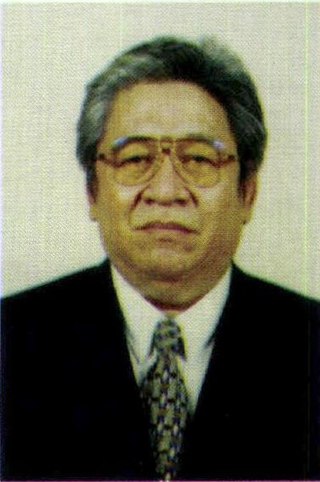
Muhammad Taufiq Kiemas was an Indonesian politician who served as the Speaker of the People's Consultative Assembly of Indonesia from 2009 until his death in 2013. A member of the Indonesian Democratic Party of Struggle (PDI-P), he was the husband of party chairwoman Megawati Sukarnoputri, president of Indonesia from 2001 to 2004. He remains Indonesia's only first gentleman.
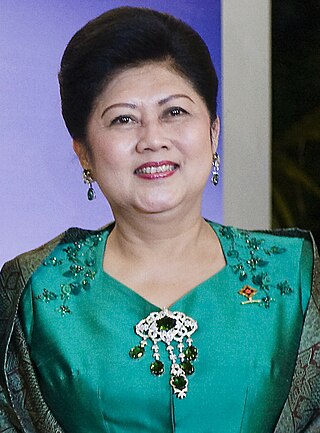
Kristiani Herrawati Yudhoyono was an Indonesian political and female activist, who was the wife of former Indonesian President Susilo Bambang Yudhoyono and First Lady of Indonesia from 2004 until 2014. She was also the daughter of Sarwo Edhie Wibowo.

Atika Lynn Shubert is an American CNN journalist based in Valencia, Spain. She covers Spain as well as the rest of Europe for CNN. Before her promotion she was based in Berlin and in London. Prior to working for CNN, she was a correspondent for The Washington Post and The New Zealand Herald in Indonesia as she speaks both English and Indonesian fluently. She is a graduate of the Class of 1991 of Jakarta International School. She is an economics graduate of Tufts University in Medford, Massachusetts, US.

Legislative elections were held in Indonesia on 9 April 2009 for 132 seats of the Regional Representative Council (DPD) and 560 seats of the People's Representative Council (DPR). A total of 38 parties met the requirements to be allowed to participate in the national elections, with a further six regional parties contesting in Aceh only. The Democratic Party of incumbent President Susilo Bambang Yudhoyono won the largest share of the vote, followed by Golkar and the Indonesian Democratic Party of Struggle.

Indonesia–Russia relations are the bilateral relations between Indonesia and Russia. Indonesia and the Soviet Union established diplomatic relations in 1950. Russia has an embassy in Jakarta, and Indonesia has an embassy in Moscow along with a consulate general in Saint Petersburg. Both countries are members of the APEC and G-20.

Indonesia–Libya relations were established on October 17, 1991. Indonesia has an embassy in Tripoli and Libya has an embassy in Jakarta. Both nations are members of the Organisation of Islamic Cooperation and the Non-aligned Movement.

The roles of women in Indonesia today are being affected by many factors, including increased modernization, globalization, improved education and advances in technology. Many Indonesian women choose to reside in cities instead of staying in townships to perform agricultural work because of personal, professional, and family-related necessities, and economic requirements. These women are moving away from the traditional dictates of Indonesian culture, wherein women act simply and solely as wives and mothers. At present, the women of Indonesia are also venturing actively into the realm of national development, and working as active members of organisations that focus and act on women's issues and concerns.

Indonesia–North Korea relations refers to bilateral relations between Indonesia and North Korea. The two countries established diplomatic relations on 16 April 1964. Indonesia is one of the very few countries that still tries to maintain cordial relations with North Korea, despite the widespread international sanctions and resulting isolation imposed on North Korea, compounded with the negative reputation of its human rights, nuclear weapons and ballistic missile programs and Indonesia's publicly more robust engagement and partnership with South Korea.
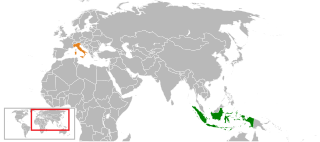
Indonesia and Italy established diplomatic relations on 29 December 1949. Italy has shown strong desire to improve its relations with Indonesia, especially in intercultural understanding and trade. Indonesia recognizes Italy's strategic location and important role in the middle of Mediterranean region, while Italy has favoured relations with Indonesia, and sees Indonesia as the leader in Southeast Asia. The relations between two countries not only important to bridge the two regional communities; European Union and ASEAN, but also vital as intercultural and interfaith dialog, since Indonesia has the largest Muslim population in the world, and Italy is the heart of the Catholic faith.

Diah Permana Rachmawati Sukarnoputri was an Indonesian politician. Her father was Indonesia's founding president Sukarno and her elder sister is Megawati Sukarnoputri, who was Indonesia's fifth president.

Puan Maharani Nakshatra Kusyala Devi is an Indonesian politician from the Indonesian Democratic Party of Struggle (PDI-P), who is serving as the current speaker of the House of Representatives (DPR), Indonesia's lower house since 2019. She is the first female and the third-youngest person to take the office permanently, being aged 46, when she took the oath of office. She previously served as the Coordinating Minister for Human Development and Cultural Affairs between 2014 and 2019, becoming the first female and the youngest coordinating minister, being only 41 when she took office.
The 27 July Incident was an attack by Indonesian government forces on the head office of the Indonesian Democratic Party, which was being occupied by supporters of recently ousted party leader Megawati Sukarnoputri. It was followed by two days of riots in Jakarta.
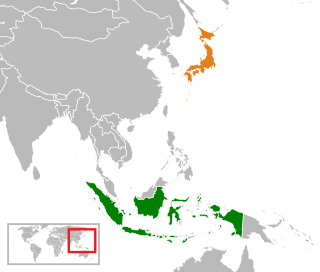
The Indonesia–Japan Economic Partnership Agreement is a bilateral agreement signed between Indonesia and Japan on 20 August 2007 and having been in force since 1 July 2008. Initiated by Japanese Prime Minister Junichiro Koizumi, it was Indonesia's first bilateral free trade agreement. Since 2013, Indonesia has requested a review of the terms of the agreement, and negotiations are currently underway.
References
- 1 2 ""Courage, Creativity, Collaboration, and Communication" are keys to building your network". Asia Society. Retrieved 2020-08-06.
- 1 2 "Karen B. Brooks". Council on Foreign Relations. Retrieved 2020-08-06.
- 1 2 "Karen B. Brooks". Council on Foreign Relations. Retrieved 2018-02-16.
- ↑ "Paradise Found". Colorado Homes & Lifestyles. 2019-07-23. Retrieved 2020-08-06.
- ↑ "The Philippines' Controversial President, Rodrigo Duterte". www.wbur.org. Retrieved 2020-08-06.
- ↑ Al Kamen (15 May 2002). "Megabites of Ram". The Washington Post . Retrieved 6 August 2020.
- 1 2 Journal, Timothy MapesStaff Reporter of The Wall Street (2002-09-20). "Indonesia Is Urged To Rein In Radical". Wall Street Journal. ISSN 0099-9660 . Retrieved 2020-08-06.
- ↑ Bonner, Raymond (2002-10-13). "Bombing at Resort in Indonesia Kills 150 and Hurts Scores More". The New York Times. ISSN 0362-4331 . Retrieved 2020-08-06.
- ↑ Perlez, Jane (2002-10-22). "For Indonesia Leader, Small Talk Edges Tough Talk". The New York Times. ISSN 0362-4331 . Retrieved 2020-08-06.
- ↑ "Jihad in Jakarta". Commentary Magazine. 2004-05-01. Retrieved 2020-08-06.
- ↑ "Indonesian Separatist Movement in Aceh". congressionalresearch.com. Retrieved 2020-08-06.
- ↑ "Hartbreaking devastation". The Straits Times. 5 January 2005. Retrieved 11 August 2020.
- ↑ "Asia awaits US investments". The Sydney Morning Herald. 2004-10-26. Retrieved 2020-08-06.
- ↑ "Catholic school in Indonesia seeks recognition for its role in Obama's life". The Washington Post . 2010-04-09. ISSN 0190-8286 . Retrieved 2020-08-06.
- ↑ "On the Quest to Conquer Cancer, Mt. Everest". www.newswise.com. Retrieved 2020-08-11.
- ↑ "Research Collaboration". National Brain Tumor Society. Retrieved 2020-08-11.
- ↑ "On the Quest to Conquer Cancer, Mt. Everest". WebWire. Retrieved 2020-08-11.
- ↑ "For Indonesia Leader, Small Talk Edges Tough Talk". mobile.nytimes.com. Retrieved 2018-02-16.